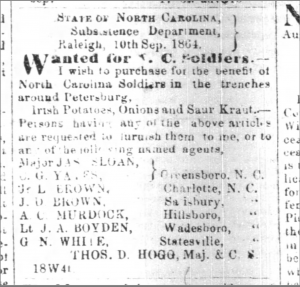
“Wanted for N.C. Soldiers.” The Greensboro Patriot, September 15, 1864.
https://universityofnorthcarolinaatchapelhill.newspapers.com/clip/18818321/food_wanted_for_north_carolina_soldiers/
This is an advertisement found in The Greensboro Patriotnewspaper dating back to September 10, 1864. The newspaper clip is a want ad that encourages North Carolinians to send food supplies to their soldiers fighting in the trenches around Petersburg. The Siege of Petersburg was a series of battles fought during the American Civil War around the cities of Richmond and Petersburg in Virginia. The battle, fought from June 1864 until April 1865, led to the eventual surrender of Robert E. Lee’s Army of Northern Virginia and ultimately to the end of the American Civil War.[1]The Battle of Petersburg was the “bloodiest campaign” of the war, leading to high rates of desertion and heavy causalities due to the lack of food.[2]
Throughout the Civil War, desertion from the army was a continuous issue for the Confederacy. The brutal battles, failing war effort, and poor conditions at Petersburg resulted in the attrition of the Confederate Army’s size and strength. Soldiers endured months of disease, sickness, and hunger which led to an increase in abandonment and death. According to Patrick John Hussey, “The siege directly affected the physical condition of the soldiers, serving to test the limits of human agony and endurance.”[3]The lack of food and severe hunger is what led to the surrender of the Confederacy and their loss of the war.
When the war began, the Federal government imposed a blockade on the Confederacy to stop the export of cotton and the import of military equipment into states that had seceded. The blockade had a crucial unintended consequence: it greatly reduced the number of foodstuffs going into the Confederacy.[4]The severe effects of this blockade became evident during the Siege of Petersburg because the need for food and supplies was at an all-time high.
Newspapers began publishing want advertisements, similar to this one, requesting that food be sent to soldiers from their area as a solution to the shortage. The Confederate armies needed every man who could still fight, and so civilians would send food to show support. North Carolinians were requested to send vegetables such as Irish potatoes, sauerkraut, and onions. The inclusion of soldiers’ names personalized the advertisement and added emotional appeal, encouraging the citizens in the Greensboro area to send food.
Towards the end of the war, however, little food reached the troops due to the decline in total food production on plantations and the demise of the South’s transportation system. This food scarcity, therefore, played a crucial role in the Civil War. It affected the outcome of the war and greatly influenced civilian support and soldiers’ morale.
[1]Hussey, Patrick John. “Honor from the Trenches: Why Confederate Soldiers Fought at Petersburg.” Order No. 10631661, The College of William and Mary, 2013. 4-5.
[2] Hussey, Patrick John. “Honor from the Trenches: Why Confederate Soldiers Fought at Petersburg.” Order No. 10631661, The College of William and Mary, 2013. 6
[3] Hussey, Patrick John. “Honor from the Trenches: Why Confederate Soldiers Fought at Petersburg.” Order No. 10631661, The College of William and Mary, 2013. 8
[4] Smith, Andrew F. “Did Hunger Defeat the Confederacy?” In Starving the South: How the North Won the Civil War.New York: St. Martin’s Press, 2011. Accessed October 6, 2018. www.andrewfsmith.com. 40-41